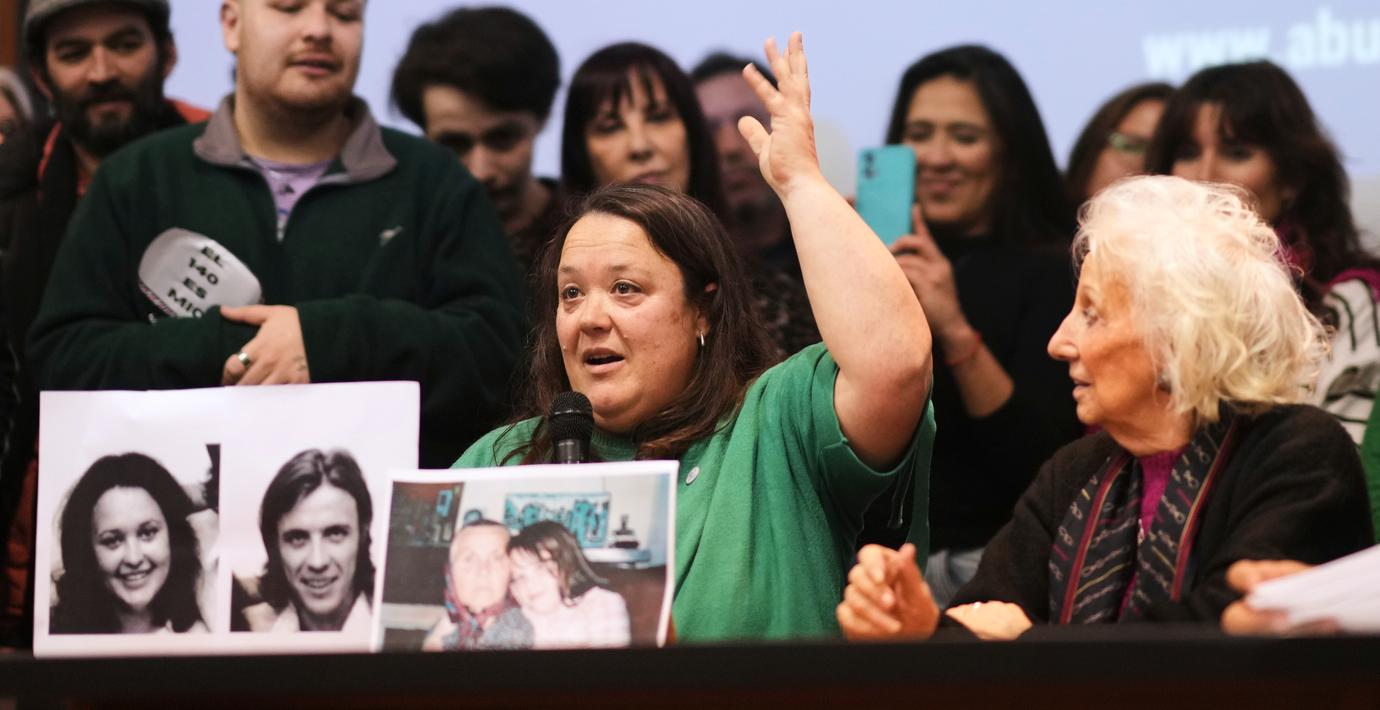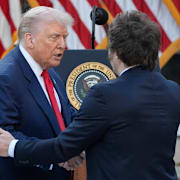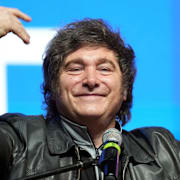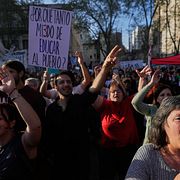
Adriana återförenad med sin bror efter 49 år
En 49-årig man som togs av den argentinska militären som nyfödd har nu återförenats med sin familj. Det uppger organisationen Abuelas de Plaza de Mayo som arbetar med att återfinna barn till föräldrar som mördades eller försvann i samband med den argentinska diktaturen på 70- och 80-talet, enligt flera medier.
Mannens föräldrar, Graciela Alicia Romero och Raul Eugenio Metz, kidnappades av regimen efter militärkuppen 1976. Då var hans storasyster Adriana Metz bara ett och ett halvt år gammal. Nu sitter hon i organisationens styrelse.
När hon fick prata med sin bror för första gången fick hon reda på att han vuxit upp som ensambarn.
– Från och med nu är allt en vinst för familjen Metz-Romero, säger hon på en pressträff.
bakgrund
Abuelas de Plaza de Mayo
Wikipedia (en)
The Grandmothers of Plaza de Mayo (Spanish: Asociación Civil Abuelas de Plaza de Mayo) is a human rights organization with the goal of finding the children stolen and illegally adopted during the 1976–1983 Argentine military dictatorship. The president is Estela Barnes de Carlotto.
The organization was founded in 1977 to locate children kidnapped during the repression, some of them born to mothers in prison who later "disappeared", and to return the children to their surviving biological families. Around 30,000 people between the ages of 16 and 35 are believed to have disappeared; around 30% were women, and of those women, around 3% were pregnant. The work of the Grandmothers, assisted by United States geneticist Mary-Claire King, has led to the location of about 25 percent of the estimated 500 children kidnapped or born in detention centers. During the military era they were illegally adopted, with their original identities hidden.
By 1998 the identities of about 71 missing children had been documented. Of those, 56 were located alive and 7 others had died. The Grandmothers' work led to the creation of the Argentine Forensic Anthropology Team and the establishment of the National Bank of Genetic Data. Aided by breakthroughs in genetic testing, the Grandmothers succeeded in returning 31 children to their biological families. In 13 other cases, adoptive and biological families agreed to jointly raise the children after they had been identified. The remaining cases are bogged down in court custody battles between families. As of July 2023, their efforts have resulted in finding 133 grandchildren.
The kidnapped babies were part of a systematic government plan during the "Dirty War" to pass the children for adoption by military families and allies of the regime and thereby avoid raising another generation of subversives. According to the Inter-American Commission on Human Rights (IACHR), the junta feared that "the anguish generated in the rest of the surviving family because of the absence of the disappeared would develop, after a few years, into a new generation of subversive or potentially subversive elements, thereby not permitting an effective end to the Dirty War".
As an offshoot of the Silvia Quintela case, former dictator Jorge Videla was detained under house-arrest in 2010 on multiple charges of kidnapping children. In July 2012 he was convicted and sentenced to fifty years in prison for the systematic stealing of babies.
On 14 September 2011 the Grandmothers of Plaza de Mayo received the Félix Houphouët-Boigny Peace Prize in Paris for their work in defense of Human Rights.
bakgrund
Statskuppen i Argentina 1976
Wikipedia (sv)
Statskuppen i Argentina 1976 genomfördes den 24 mars 1976. Då avsattes president Isabel Perón. I stället tillträdde en militärjunta, som leddes av general Jorge Rafael Videla, amiral Emilio Eduardo Massera och brigadör Orlando Ramón Agosti. Juntan antog namnet "Proceso de Reorganización Nacional", och satt vid makten fram till 1983.
Fastän det politiska förtrycket (det så kallade "Smutsiga kriget") började före kuppen, liksom Operativo Independencia, förvärrades läget efter kuppen, och ledde till försvinnandet av mellan 7 000 och 30 000 människor, siffrorna varierar mellan olika källor.
Två dagar efter kuppen, skrev amerikanske William D. Rogers från USA:s utrikesdepartement:
"This junta is testing the basic proposition that Argentina is not governable...I think that's a distinctly odds-on choice.[...]I think also we've got to expect a fair amount of repression, probably a good deal of blood, in Argentina before too long. I think they're going to have to come down very hard not only on the terrorists but on the dissidents of trade unions and their parties."
USA:s utrikesminister Henry Kissinger sade att "Whatever chance they have, they will need a little encouragement" och "because I do want to encourage them. I don't want to give the sense that they're harassed by the United States."
I juni 1976 kritiserades juntans kränkning av mänskliga rättigheter i USA, Kissinger uttalade dock sitt fortsatta stöd för juntregimen, och talade direkt till Argentinas utrikesminister, amiral César Augusto Guzzetti på ett möte i Santiago de Chile.
24 mars blev sedan Hågkomstdagen för sanning och rättvisa.
Omni är politiskt obundna och oberoende. Vi strävar efter att ge fler perspektiv på nyheterna. Har du frågor eller synpunkter kring vår rapportering? Kontakta redaktionen



